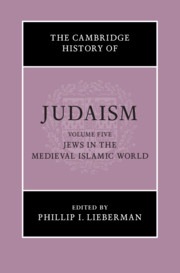Book contents
- The Cambridge History of Judaism
- The Cambridge History of Judaism
- The Cambridge History of Judaism
- Copyright page
- Contents
- Figures
- Acknowledgments
- Introduction
- Part I Jews in the Medieval Islamic World
- Part II Social and Institutional History
- Part III Spiritual and Intellectual History
- Chapter 17 Karaism
- Chapter 18 Non-Rabbinic and Non-Karaite Religious Movements
- Chapter 19 Languages and translation
- Chapter 20 Book Production
- Chapter 21 Jewish Bible Exegesis in Muslim Lands in the Middle Ages
- Chapter 22 Jewish Law
- Chapter 23 Liturgy
- Chapter 24 Piyyuṭ
- Chapter 25 Jewish Philosophy
- Chapter 26 Science and Medicine
- Chapter 27 Magic
- Chapter 28 Mysticism
- Chapter 29 Belles Lettres
- Chapter 30 Jewish-Muslim Polemics
- Chapter 31 Historiography
- Chapter 32 Material Culture, Art, and Architecture
- Index
- References
Chapter 24 - Piyyuṭ
from Part III - Spiritual and Intellectual History
Published online by Cambridge University Press: 21 August 2021
- The Cambridge History of Judaism
- The Cambridge History of Judaism
- The Cambridge History of Judaism
- Copyright page
- Contents
- Figures
- Acknowledgments
- Introduction
- Part I Jews in the Medieval Islamic World
- Part II Social and Institutional History
- Part III Spiritual and Intellectual History
- Chapter 17 Karaism
- Chapter 18 Non-Rabbinic and Non-Karaite Religious Movements
- Chapter 19 Languages and translation
- Chapter 20 Book Production
- Chapter 21 Jewish Bible Exegesis in Muslim Lands in the Middle Ages
- Chapter 22 Jewish Law
- Chapter 23 Liturgy
- Chapter 24 Piyyuṭ
- Chapter 25 Jewish Philosophy
- Chapter 26 Science and Medicine
- Chapter 27 Magic
- Chapter 28 Mysticism
- Chapter 29 Belles Lettres
- Chapter 30 Jewish-Muslim Polemics
- Chapter 31 Historiography
- Chapter 32 Material Culture, Art, and Architecture
- Index
- References
Summary
Piyyuṭ (pl. piyyuṭim) is the Hebrew term for liturgical poetry that embellishes the public recitation of the statutory prayers recited in the synagogue by the precentor (ḥazzan). As a substitute for most of the fixed versions of the obligatory prayers (except for the berakhot), its function was to introduce variety, in this case through artistic poetic expression, to the established, statutory prayers.
- Type
- Chapter
- Information
- The Cambridge History of Judaism , pp. 780 - 795Publisher: Cambridge University PressPrint publication year: 2021



